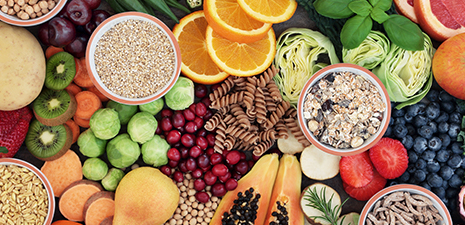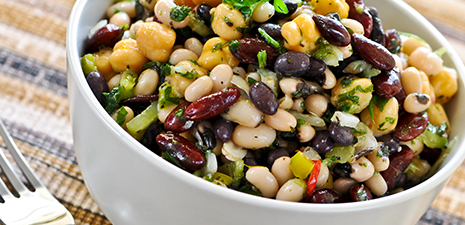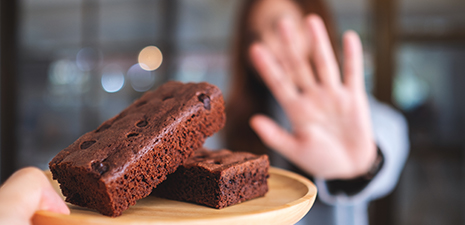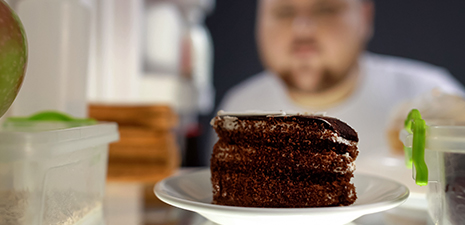One of the best ways to sate your hunger and avoid snacking between meals is by loading up on these filling foods. Discover what foods will help satisfy your hunger with dietitian Melissa Nieves.

7 Science-Backed Strategies to Curb Hunger
Hunger comes from two sources: a physical need for food and psychologically-based cravings.1 And, of course, it’s possible to have both at the same time.
Scientifically Proven Ways to Cut Mental Hunger Pangs
Since the sensation of hunger is registered and interpreted by your mind, let’s look here first.
Stress
Anything that lowers your stress level helps you avoid feeling hungry until your body is really in physical need of food.2 This is both mental and hormonal. Stress causes the release of cortisol, which can raise your blood sugar and increase appetite. It is also important to separate “stress eating” – munching when you are angry, sad or frustrated—from actual hunger for food (this is also known as mindful eating).3
Sleep
Sleeping less than seven to eight hours at night can lead to a higher body mass index (BMI).4 Disrupted sleep can also lead to cortisol (the same hormone your body releases during stress) release, which can cause weight gain. Your body does an incredible amount of repair work and hormone balancing while sleeping, so good sleep hygiene is important.5 Lower your activity as bedtime approaches, sleep in a cool dark room, avoid alcohol and get at least seven hours of sleep per night.
Power of Suggestion
Eating cues can be internal or external, and noticing the difference can help you reach your goals. Internal cues to eat are usually based on feelings such as hunger or stress.2 But also notice your external cues. For example, when I drive home from my office, my mind starts to plan the snack I will eat when I walk in, even if I am not hungry! Smells and sights—such as seeing people eating or even billboard ads—can stimulate the sensation of hunger.6 Before you eat, ask yourself whether you’re genuinely hungry or just being prompted by one of these sources.
Scientifically Sound Strategies to Curb Physical Hunger
In addition to these mental approaches to curbing hunger, there are physical strategies to help control your appetite.
Water
The human body often confuses thirst with hunger. When you feel hungry, drink a glass of water first, and then gauge how you feel a few minutes later. Drinking water not only fills your stomach, reducing the release of the hunger hormone ghrelin, it is essential for optimal cell function to burn the fuel you are carrying in addition to the food you eat.7 Experts don’t agree on the perfect amount of water for every individual since the person’s weight, level of activity and medical issues would need to be considered.
Eating on a Schedule
Your metabolism and liver function best when you eat at regular intervals throughout the day. Some strategies for weight and blood sugar management recommend eating regularly throughout the day, including meals and snacks.8 As a professional, I recommend that most people not go longer than 4 hours between meals. This trains the brain to expect food on a schedule and helps control feeling overly hungry in anticipation.9
Conversely, some people benefit from intermittent fasting, not eating anywhere from 12 to 18 hours per day, and taking in all their calories in the remaining hours. This method helps some feel less hunger overall.10
Fiber
In addition to drinking water and eating on a schedule, certain types of foods may help curb your appetite. Fiber, protein, healthy fats and various other foods influence how hungry we feel.
Fiber supplements can be helpful. Also, eating fiber-rich foods help you get plenty of fiber in your diet. Among many others, these include:11
- whole (not blended) fruits and vegetables
- beans
- some whole grains
Fiber stays in your digestive tract longer and helps you feel full (and therefore not hungry) longer.12
Protein and Healthy Fats
Getting enough protein also helps curb hunger. Protein-rich breakfasts in particular are shown to help reduce hunger.13 Healthy fats are also very helpful for good appetite control throughout the day. While the overconsumption of unhealthy fats contributes to weight gain, eating healthy fats (polyunsaturated and monounsaturated fats such as in fish, olive, oil, seeds and eggs) can help you feel full longer and possibly boost your metabolism.14
Try one of more of these science-backed suggestions to help you curb your appetite and achieve success with your weight and your health.
Rx Only. For the safe and proper use of Plenity or more information, talk to a healthcare professional, read the Patient Instructions for Use.
-
Herman CP, Polivy J. External cues in the control of food intake in humans: the sensory-normative distinction. Physiol Behav. 2008 Aug 6;94(5):722–8. doi: 10.1016/j.physbeh.2008.04.014. Epub 2008 Apr 13. PMID: 18499202.
https://pubmed.ncbi.nlm.nih.gov/18499202/ -
Chao, Ariana M et al. “Stress, cortisol, and other appetite-related hormones: Prospective prediction of 6-month changes in food cravings and weight.” Obesity (Silver Spring, Md.) vol. 25,4 (2017): 713–720. doi:10.1002/oby.21790
https://www.ncbi.nlm.nih.gov/pmc/articles/PMC5373497/ -
Yau, Y H C, and M N Potenza. “Stress and eating behaviors.” Minerva endocrinologica vol. 38,3 (2013): 255-67.
https://www.ncbi.nlm.nih.gov/pmc/articles/PMC4214609/ -
Prinz, Patricia. “Sleep, appetite, and obesity—what is the link?” PLoS medicine vol. 1,3 (2004): e61. doi:10.1371/journal.pmed.0010061
https://www.ncbi.nlm.nih.gov/pmc/articles/PMC535424/ -
Leproult R, Van Cauter E. Role of sleep and sleep loss in hormonal release and metabolism. Endocr Dev. 2010;17:11–21. doi:10.1159/000262524
https://www.ncbi.nlm.nih.gov/pmc/articles/PMC3065172/ -
Els Bilman, Ellen van Kleef, Hans van Trijp, “External cues challenging the internal appetite control system—Overview and practical implications” Taylor & Francis Online Pages 2825–2834,13 Oct 2015, Published online:08 May 2017
https://www.tandfonline.com/doi/full/10.1080/10408398.2015.1073140 -
Parretti HM, Aveyard P, Blannin A, et al. Efficacy of water preloading before main meals as a strategy for weight loss in primary care patients with obesity: RCT. Obesity (Silver Spring). 2015;23(9):1785–1791. doi:10.1002/oby.21167
https://pubmed.ncbi.nlm.nih.gov/26237305/ -
Farshchi HR, Talor MA, Macdonald IA. Beneficial metabolic effects of regular meal frequency on dietary thermogenesis, insulin sensitivity, and fasting lipid profiles in healthy obese women. Am J Clin Nutr 2005;81:16–24.
https://pubmed.ncbi.nlm.nih.gov/15640455/ -
Eating Frequency and Weight Loss. Harvard Health Publishing. 2015.
https://www.health.harvard.edu/diet-and-weight-loss/eating-frequency-and-weight-loss - Eric Ravussin, Robbie A. Beyl, Eleonora Poggiogalle, Daniel S. Hsia, and Courtney M. Peterson. “Early Time-Restricted Feeding Reduces Appetite and Increases Fat Oxidation But Does Not Affect Energy Expenditure in Humans” Obesity (2019) 27, 1244–1254. doi:10.1002/oby.22518 https://onlinelibrary.wiley.com/doi/pdf/10.1002/oby.22518
-
Fiber. Harvard T.H. Chan School of Public Health.
https://www.hsph.harvard.edu/nutritionsource/carbohydrates/fiber/ -
Perrigue MM, Monsivais P, Drewnowski A. Added soluble fiber enhances the satiating power of low-energy-density liquid yogurts. J Am Diet Assoc. 2009 Nov;109(11):1862–8. doi: 10.1016/j.jada.2009.08.018. PMID: 19857627.
https://pubmed.ncbi.nlm.nih.gov/19857627/ - Kung B, Anderson, GH, Pare S, Tucker AJ, Vien S, Wright AJ, Goff HD. “Effect of milk protein intake and casein-to-whey ratio in breakfast meals on postprandial glucose, satiety ratings, and subsequent meal intake” Journal of Dairy Science. Volume 101, Issue 10, P8688–8701, October 1, 2018. https://doi.org/10.3168/jds.2018-14419
- Eating diet high in polyunsaturated fats can protect against effects of ‘splurge’ meals, study finds. University of Georgia. @UGA Research https://research.uga.edu/news/eating-diet-high-in-polyunsaturated-fats-can-protect-against-effects-of-splurge-meals-study-finds/





